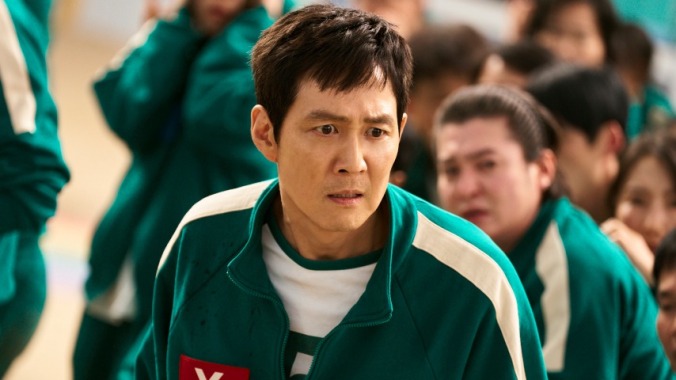Despite Pacing Issues, Squid Game Is Still Ready To Play In Season Two
Photo courtesy of Netflix
Squid Game was an overnight sensation that no one saw coming, but in retrospect, its massive popularity makes perfect sense: of course a story about economic inequality and fiscal exploitation would do gangbusters. However heightened, it spoke to deeply felt frustrations that resonated with viewers worldwide: as South Korean director Bong Joon Ho put it regarding his own film Parasite, “We all live in the same country, it’s called capitalism.” Beyond this, it certainly didn’t hurt Squid Game‘s appeal that its message was packaged within a propulsive death game structure that kept audiences on the edge of their seats as its characters risked their lives for a few dollars more. Even if its ideas sailed over your head, like whichever business execs at Netflix greenlit the Squid Game-themed reality TV show which entirely missed or ignored what the series was saying, there was still much to enjoy.
Now, more than three years later, showrunner and director Hwang Dong-hyuk’s Squid Game is finally back with a second season that’s just as barbed and justifiably angry as the first. But while this follow-up maintains its sharp political commentary and adds some compelling new lines of thought, its poorer pacing, unsatisfying cliffhanger ending, and occasional overfamiliarity hold it back from its predecessor. The series is still visceral and often engaging, but it’s not as tightly written, falling into commonplace TV woes as it struggles to get to the point. Thankfully, though, there’s still enough here thematically to largely make up for these shortcomings.
The story picks up with Gi-hun (Lee Jung-jae) carrying out his plan to end the Squid Game for good. He’s spent two years burning through blood money to track down the game’s enigmatic ringleaders, but even after all this time, he’s got nothing to show for it. However, after meeting up with Jun-ho (Wi Ha-joon), the police officer looking for his missing brother last season, the two end up with a lead that brings Gi-hun back into the belly of the beast. After Plan A goes awry, he once again enters the games, this time intending to bring it all down.
From the jump, this season faced a tricky storytelling dilemma: do you repeat the games all over again and risk overfamiliarity, or attempt to do something new that could potentially lose the essence of what came before? The latest season tries to split the difference with mixed results. Specifically, it attempts to develop storylines outside these deadly trials, but they’re often the least interesting stretches of this season. Besides a few tense moments early on, these scenes mostly spin their wheels. And although things become more interesting after Gi-hun takes up the mantle of Player 456 again as he’s surrounded by ethical dilemmas and buckets of bloodshed, this premise admittedly feels a bit less novel this time around. These games eventually go to fresh places that recreate some of the first season’s cold dread as we witness new depraved challenges, but it’s still not quite as thrilling.
However, perhaps the biggest issue with this latest run is that its pacing is frequently lethargic, extending circumstances that could have been conveyed in four or five episodes into a seven-episode season. While this gives the cast space to develop, many storylines come across as extraneous in the process. And then, despite taking its time, the final episode rushes through a paradigm shift that should have come sooner, culminating in a non-ending that makes this feel like the first half of a season instead of a self-contained arc.
However, while these significant flaws may make it tempting to write off this latest run, underneath these gaffes, this show remains incisive, thoughtful, and rightfully pissed off at the status quo. It continues to expose the evils of a system that treats human beings like trash, depicting systemic cruelty while leaving room for unexpected moments of humanity and solidarity. And beyond these familiar ideas, this latest season has a timely focus on how capitalism overlaps with flawed democratic processes.
-

-

-

-

- Curated Home Page Articles By Test Admin October 21, 2025 | 3:10pm
-

- Curated Home Page Articles By Test Admin October 21, 2025 | 2:57pm
- Urls By Test Admin October 21, 2025 | 2:57pm
- Curated Home Page Articles By Test Admin October 21, 2025 | 2:55pm
-

-

-

-

-

-

-

-

-

-

-

-

-

-

-

-

-

-

-

-

-

-

-

-

-

-

-

-

-

-

-




































